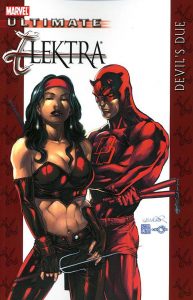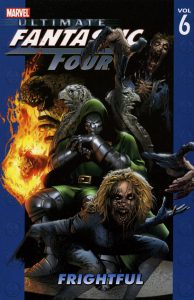In Devils, the Fantastic Four once again tangle with their first enemy, the Mole Man, an event which might turn out to have unintended and far-reaching consequences. I’m not really sure I trust the storyline to go anywhere, though, since it was part of an annual, which issues tend to be further than usual outside the main story arc of any Marvel comic I’ve read. (On the bright side, they are never completely separated from it, either, which still keeps them ahead of my expectations.)
But then they tangled with a Renaissance alchemist called Diablo. And a lot of other alchemists who were less evil but also had a lot of magical powers nevertheless. So, apparently, there’s magic in the Ultimate universe, not just lots of freaky science accidents. I guess I’m less okay with this than I expected, and probably because it’s taken so long to appear. Still, it’s a comic, and I’ll get over it here soon. More disconcerting was how containedly episodic the entire sequence felt. I won’t really know if I’m wrong about that for quite a while, but it might be worse if I am, since it really wouldn’t make any sense to dig the storyline up again, so solidly was it concluded.
Well, okay, there was one reasonably cool loose end. And time travel, which is always fun, even when there are no apparent consequences.
 It has not been difficult for me to find graphic novels from the Ultimate Marvel series in my various used bookstores. I don’t have all of them by any means, but I’ve been able to pick up a lot just by keeping my eyes open. And then there’s the ambitiously numbered volume one of the Ultimate Elektra series, which seemed to have five or more copies available at every store I entered over the course of 2008. Which, despite the underlying snarkiness of that fact, is not to say that it was a bad book.
It has not been difficult for me to find graphic novels from the Ultimate Marvel series in my various used bookstores. I don’t have all of them by any means, but I’ve been able to pick up a lot just by keeping my eyes open. And then there’s the ambitiously numbered volume one of the Ultimate Elektra series, which seemed to have five or more copies available at every store I entered over the course of 2008. Which, despite the underlying snarkiness of that fact, is not to say that it was a bad book.
 I’m not really sure what was done differently, but the latest volume of the Ultimate Fantastic Four managed to be as busy as the last few have been while simultaneously not feeling like each individual story was rushed. If anything, it felt like a return to the madcap days of the ’60s where each storyline lasted for two or three issues and hints of the future or ties to the past bled into each individual magazine; in short, like there was an ongoing, somewhat-planned story arc. It turns out, I really dig that.
I’m not really sure what was done differently, but the latest volume of the Ultimate Fantastic Four managed to be as busy as the last few have been while simultaneously not feeling like each individual story was rushed. If anything, it felt like a return to the madcap days of the ’60s where each storyline lasted for two or three issues and hints of the future or ties to the past bled into each individual magazine; in short, like there was an ongoing, somewhat-planned story arc. It turns out, I really dig that.